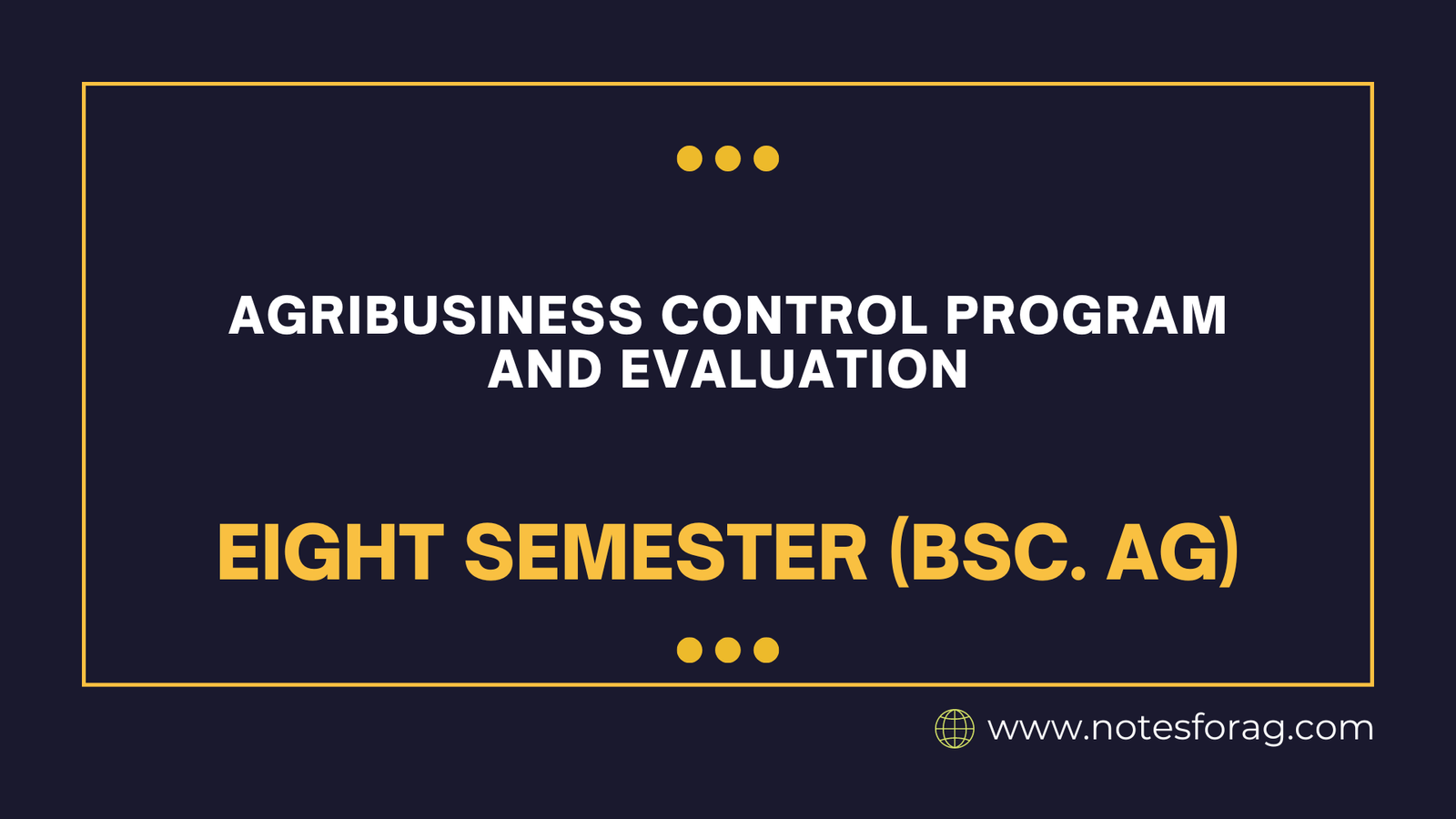Agribusiness, the intersection of agriculture and business, involves a complex chain of activities from farm production to market delivery. Effective management of this process requires a robust control program, ensuring sustainability, profitability, and efficiency across the value chain. The “Agribusiness control” refers to the systems, processes, and tools used to monitor, regulate, and optimize the operations in this sector. This encompasses production, supply chain management, financial operations, marketing strategies, and regulatory compliance.
Table of Contents
An agribusiness control program is essential for mitigating risks, improving operational performance, and maximizing profits. Given the dynamic nature of agriculture—subject to unpredictable variables such as weather, market fluctuations, and resource availability—control mechanisms are vital to ensure stability. Below is an overview of the major components of an agribusiness control program and its evaluation.
1. Components of Agribusiness Control
a. Production Control
Production control involves managing the processes related to the cultivation, harvesting, and processing of agricultural products. In this area, agribusiness control tools monitor the yield, the use of inputs (such as water, fertilizers, and seeds), and labor management. The control mechanisms ensure that optimal practices are followed for high-quality and high-quantity outputs. Precision agriculture technologies, like sensors and GPS-guided equipment, are becoming crucial in production control, enhancing resource efficiency and productivity.
b. Supply Chain Management
The agribusiness supply chain is extensive, covering logistics from raw material sourcing to distribution. Effective control in this area includes managing inventory levels, transportation, storage, and delivery. It also involves maintaining strong relationships with suppliers, distributors, and retailers. An agribusiness control system ensures that supply chain processes are synchronized, reducing delays, spoilage, and losses. Technologies like blockchain and IoT devices play a pivotal role in providing transparency and traceability in the supply chain, thereby improving accountability.
c. Financial Control
Financial control is critical to the overall health of an agribusiness operation. This involves budgeting, financial planning, and performance monitoring. Agribusiness control programs ensure that cash flow is maintained, profits are maximized, and costs are minimized. They also help in managing risks associated with price volatility, resource costs, and external economic pressures. Financial controls are achieved through the use of software systems that track expenses, revenues, and investments in real time.
d. Marketing and Sales Control
The control of marketing and sales strategies in agribusiness is essential for ensuring that products reach the right markets and customers. It involves demand forecasting, pricing strategies, and promotional activities. Marketing control mechanisms assess the performance of campaigns and adjust strategies as needed. Sales control, on the other hand, monitors product distribution channels and customer satisfaction, ensuring market competitiveness.
e. Regulatory and Compliance Control
Agribusiness operations are subject to various government regulations, including environmental standards, labor laws, and trade policies. Control programs ensure that all aspects of the business comply with legal requirements, avoiding potential fines or penalties. These systems also ensure the business meets sustainability goals and ethical standards, contributing to the long-term viability of agribusiness.
2. Evaluation of Agribusiness Control Programs
The evaluation of an agribusiness control program assesses its effectiveness in achieving the desired operational and financial goals. An effective control program should:
- Improve Efficiency: A key metric for evaluation is the improvement in efficiency throughout the agribusiness process. This includes increased production yields, optimized input usage, and reduced waste in the supply chain.
- Mitigate Risks: The control program should successfully identify and mitigate risks related to climate, market fluctuations, and supply disruptions. Tools like predictive analytics help in forecasting potential risks and preparing strategies in advance.
- Enhance Profitability: Financial performance is a critical evaluation parameter. A well-implemented control program should lead to higher profitability through reduced costs, improved sales, and optimal use of resources.
- Ensure Compliance: The evaluation also measures how well the agribusiness adheres to regulatory standards and industry best practices. Non-compliance can result in penalties, so a program must include mechanisms for regular monitoring of legal and ethical requirements.
- Support Sustainability: A modern agribusiness control program is expected to align with sustainable farming practices. Evaluation should look at the program’s contribution to reducing the environmental footprint, promoting biodiversity, and conserving resources like water and soil.
Conclusion
Agribusiness control is a broad notion that encompasses production, supply chain management, financial, marketing, and regulatory monitoring. An effective control programme is critical for agribusinesses seeking to prosper in a competitive and dynamic market. Agribusinesses can improve operational efficiency, decrease risks, increase profitability, and assure compliance with industry standards and environmental requirements by installing thorough control systems and reviewing their efficacy on a regular basis. This comprehensive approach to control not only delivers short-term advantages, but also assures the long-term viability of the agribusiness industry.
Frequently Asked Questions (FAQs)
What is agribusiness control?
Agribusiness control refers to the systems and processes used to monitor and optimize various operations in farming and agricultural businesses, including production, supply chain, finances, marketing, and compliance.
Why is agribusiness control important?
Agribusiness control helps improve efficiency, reduce risks, maximize profitability, and ensure compliance with regulations, leading to sustainable and profitable agricultural operations.
How can agribusiness control programs be evaluated?
Agribusiness control programs are evaluated based on their ability to enhance efficiency, mitigate risks, improve profitability, ensure regulatory compliance, and support sustainable farming practices.
Related Articles

